The Pros and Cons of Autoflowering Cannabis Seeds: A Fast Buds Primer - Part 2
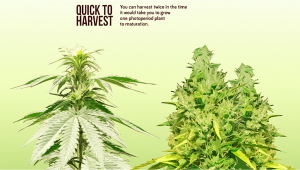
- 1. What are the advantages of autoflowering cannabis?
- 1. a. Flexible growing environment
- 1. b. Fast growing
- 1. c. Resilient to the environment
- 1. d. Stout plants
- 1. e. Discretion
- 1. f. High natural resistance to pests and disease
- 1. g. Fewer nutrients needed
- 1. h. Easier to set up a perpetual harvest
- 1. i. Autos are still evolving
- 2. What are the disadvantages?
- 2. a. Vulnerable to grower mistakes
- 2. b. Accelerated growth
- 2. c. Stout plants
- 2. d. No cloning
- 3. Is it right for you?
So you’re not sure whether autoflowering seeds are right for your grow. Everyone’s setup is different, but here are a few pros and cons to help you grow the best weed possible. If you need a quick reminder as to what autoflowers are, be sure to check out What is Autoflowering Cannabis? A Fast Buds Primer - Part 1. Don’t get things twisted from the start—autoflowering cannabis cultivars offer a whole suite of benefits that makes growing weed easier than ever before. They’re rapid to grow, provide great yields, and modern varieties provide just as much THC (in some cases more) than their photoperiod counterparts.
They’re the perfect option for beginner growers, those looking for stealth, and veteran cultivators looking for a quick and easy harvest. However, like most things in life, they also have some downsides in certain scenarios. Below, you’re going to get to know autoflowering strains on an intimate level. You’ll discover exactly what makes them so great, as well as why they aren’t always the very best choice for particular situations.
1. What are the advantages of autoflowering cannabis?
Flexible growing environment
Each day, regular “photoperiod” strains require precisely twelve hours of light and twelve of darkness to trigger and maintain the flowering stage until harvest. If this doesn’t happen, they can stop growing and live for years, never producing anything. Autoflowers, on the other hand, have a fixed lifespan, shorter than any photoperiod grow. They start flowering at three to four weeks and can go from germination to harvest in just nine weeks.
Since you don’t have to control the light cycle to induce flowering with autoflowers, you don’t have to grow cannabis in an expensive, light-proof box. There’s no need to drape black sheeting over a greenhouse or set light timers to alternate at midnight and midday. With autoflowers, even urban balcony grows fare well despite the high amount of night-time ambient light.
Adding to this, autoflowering cultivars are extremely hardy, durable, and robust. Why? Because they inherited this trait from their ruderalis ancestors—a subtype of cannabis that adapted to the cold and harsh growing conditions of northern latitudes. You can get away with growing them where you simply can’t ensure good results from other varieties. Such environments include regions that experience cold and rainy weather, as well as high levels of humidity and even heat waves. Because they trace their lineage back to cold regions, they’re also perfect for growers who live far north (or south) and have to deal with a relatively short growing season. Simply sow seeds indoors early in the spring, and your plants will develop canopies packed full of colas well before the first frost of the season sets in.
Fast Growing
We call them Fast Buds for a reason! Traditional, photoperiod cannabis, can take four months or more to grow. Autoflowering marijuana, on the other hand, can be ready to harvest in as little as eight weeks, but more often nine to eleven. You can harvest four to six times a year as opposed to once or twice. This ability to harvest more frequently is excellent for outdoor growers who can’t control the lighting their plants receive, but it can also be used by indoor growers to stagger their grows to ensure they’re harvesting once a month or more.
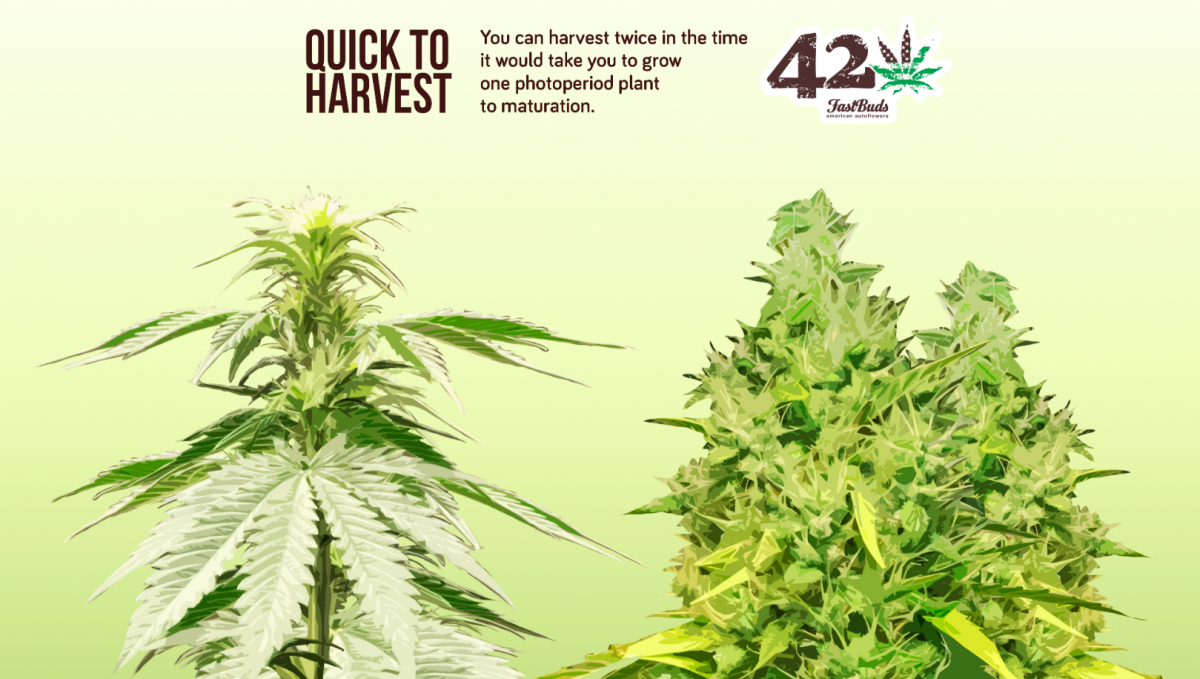
Photoperiod plants occupying the same space or grow tent need to mature together. Because the light cycles for flowering and vegging plants are entirely different, developing plants can't share the same space as those nearing harvest. However, since autoflowering strains don’t need the light cycle to control flowering, it’s possible to house multiple plants at different stages of development in one area. If you germinate a new seed every month, by month three you can be harvesting every thirty days, or three weeks, or whatever schedule works for you.
Having such speed at your potential comes with a wealth of key benefits. First of all, it comes in very handy for growers that need to remain as stealthy as possible. If keeping your herbal hobby off the radar comes first on your list of priorities as a grower, then autoflowering strains will certainly come to your aid. They’ll allow you to set up and tear down your growing operation in a matter of weeks, drastically reducing the odds of discovery. Next up, they’re highly valuable for people that grow weed for medicinal reasons. If you need a constant supply of buds, then it’s a good idea to sow an autoflowering seed every week for two. This strategy of staggered sowing will ultimately create a conveyor belt of perpetual harvests, meaning you’ll get to keep your stash jars full and your body nourished with the cannabinoids that you require. You can achieve this outcome outdoors during the growing season and move it indoors when the cold weather swoops in.
Resilient to the environment
Cannabis is a notoriously picky plant, and small changes to the environment can make a big difference in the final product. Compared to photoperiod plants, autoflowers are more resilient against diseases and weather, thanks to the industrial hemp genes that evolved for survival in harsh Siberian climates, with short summers. If you live in a mild climate, autoflowers are perfect. G14 is a hardy strain from Fast Buds ideal for those who want a resilient plant to work with.
Stout plants
Cannabis plants are huge. Some Sativas can reach four meters in height! That might be great for outdoor growers, but lots of people want to keep things indoors, perhaps away from prying eyes or hot grow tent lights.
The shortest Fast Buds strains are Rhino Ryder, Grapefruit, and Green Crack. These should always max out at less than one meter, though growers can use various techniques to constrain the vertical growth of other varieties.
Discretion
We’ve come a long way, but not everyone can grow Cannabis freely in their garden or on their balcony... yet. Until that day comes, discreet growing will remain a priority for many. Short plants, like Fast Buds', that can grow rapidly in a closet or other private location are a godsend for cannabis enthusiasts who don’t want to draw attention to themselves.
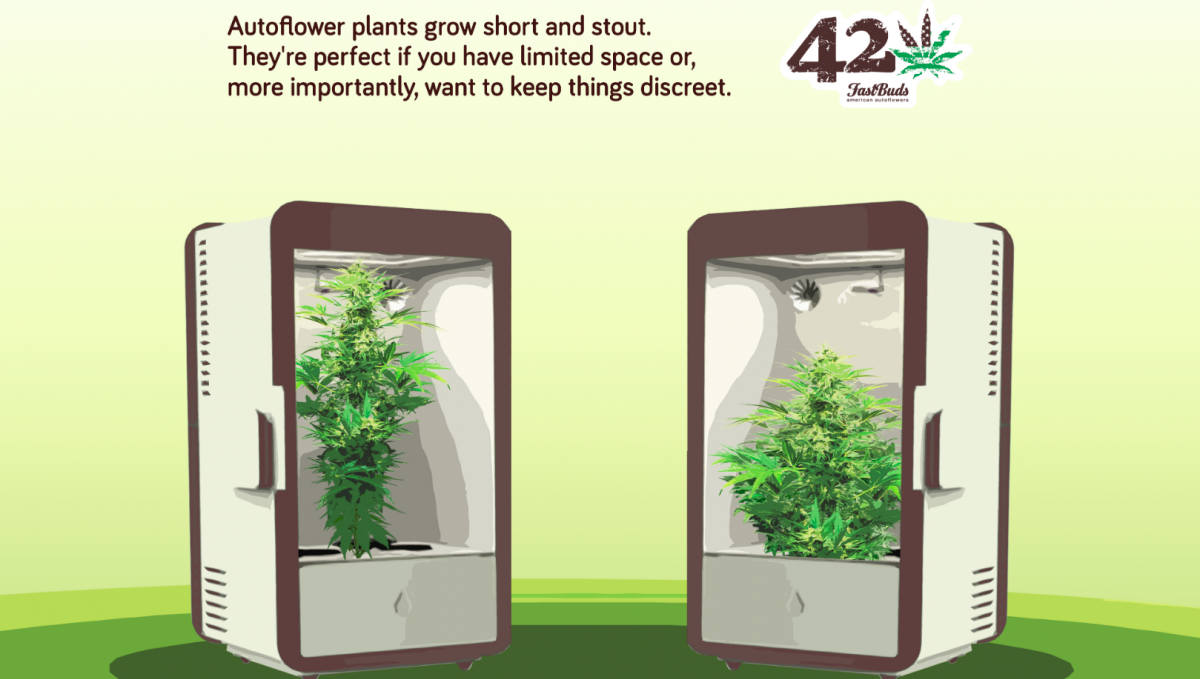
The three short, stout strains mentioned earlier, Rhino Ryder, Grapefruit, and Green Crack, work well for discreet growers, as does G14 , a hardy, resilient strain perfect for novice growers.
High Natural Resistance to Pests and Disease
In general, autoflowering cannabis strains have a higher natural resistance to a wide range of insects and pests that can plague a crop. Many cultivators report much fewer issues with bugs like spider mites, aphids, and caterpillars (among others) - even in areas where these have caused major crop headaches in the past. They also, in general, are less likely to suffer from certain disease issues than their photoperiod cousins. Autos even seem to fair better in terms of mold infestations, with fewer reports of root and bud rot. Now, this is a sweeping statement. Not every single strain will provide the same amount of natural protection, so make sure to do your research and look for strains that suit your local environment.
Fewer Nutrients Needed
This one may seem a little counterintuitive, but a large amount of auto-flowering strains actually thrive in an environment where there are fewer nutrients than you may expect, especially if you are used to growing photoperiod plants. We always suggest starting with just a quarter of the recommended dosage, and slowly increasing as the crop works its way through its life cycle. A common mistake for novice growers is to think more nutrients = more buds. It is actually the opposite in many cases.
Easier to Set Up a Perpetual Harvest
One of the biggest positives of choosing to grow autos is the fact that you can plant at any stage of the life cycle in the same indoor grow space. With photoperiod strains, you need to separate your vegging and flowering plants, but that’s not the case for autos!
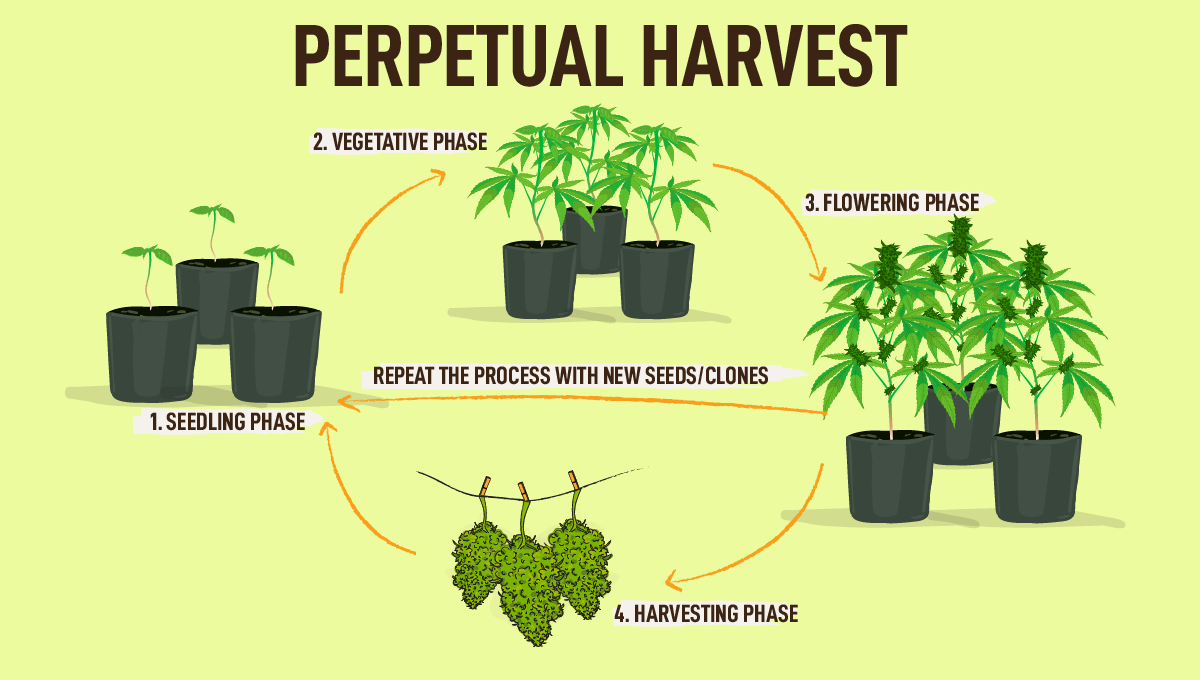
Many auto cultivators simply set the light timer to 20 hours light/4 hours dark and let the plants thrive no matter the growth stage. This means you can easily and quickly set up a perpetual harvest routine without having to build multiple, separate growing areas.
Autos Are Still Evolving
All cannabis genetics are going through a stage of huge development right now, but there is no sector where this is more evident than with autos! They really are the very tip of cannabis genetic tech right now, and the coming years will surely bring even more exciting strains for us all to enjoy.
2. What are the disadvantages?
Vulnerable to grower mistakes
Autoflowers may be resistant to various environmental stresses, but they are susceptible to human error. Many growers tie down, cut, or otherwise manipulate the branches of the growing plant to ensure proper size and make sure there are lots of places on the plant body for flowers to grow. Usually, autoflowers tolerate this treatment well. However, if an overeager grower takes these techniques too far, it will damage the plant and subject it to unnecessary stress. People manipulate photoperiod plants like this all the time; if they rough up their young cannabis plant in the process, it’s no big deal because it has months to recover. Since autoflowers come to harvest so quickly, they don’t have time to heal from overzealous poking, prodding, and pruning.
Accelerated growth
Wait, isn’t fast-growing good thing? Well, it usually is, but this monstrous growth comes with one important caveat. The accelerated transition from vegetative to flowering stages means that stress caused to autoflowering plants in the first weeks (by intentionally bending, cutting or damaging stems to manipulate growth) can hamper their final production. For the same reason, transplanting autos from indoor to outdoor (or vice versa) is never recommended. It’s always best to keep autos in the same pot from day one.
Stout Plants
For 99% of growers, stout plants are great. But not everyone grows for the same reasons. Some like to control everything to produce the most potent grow possible, others want to keep things discreet, but still, others want to raise marijuana plants worthy of an American state fair. If you’re looking to grow a massive, towering Sativa twice the height of yourself, autoflowers might not be the choice for you.
No cloning
After putting so much effort into a grow it’s easy to become attached to your plant. Or, maybe you found the perfect plant for you. In such cases, it’s possible to take a clipping from a photoperiod plant and grow a new one with 100% identical genetics. This is what industrial-scale growers often do, keeping a “clone mother” from which they take cuttings to grow into harvestable plants. Cloning like this isn’t possible with autoflowering plants. However, Fast Buds’ awarding winning genetics and germination guarantee mean that you’ll always be able to grow the strain that’s right for you.
3. Is it right for you?
Thousands of growers choose autoflowering plants with these trade-offs in mind. Fast Buds' customers include privately minded closet growers, as well as commercial growers with massive outdoor operations.
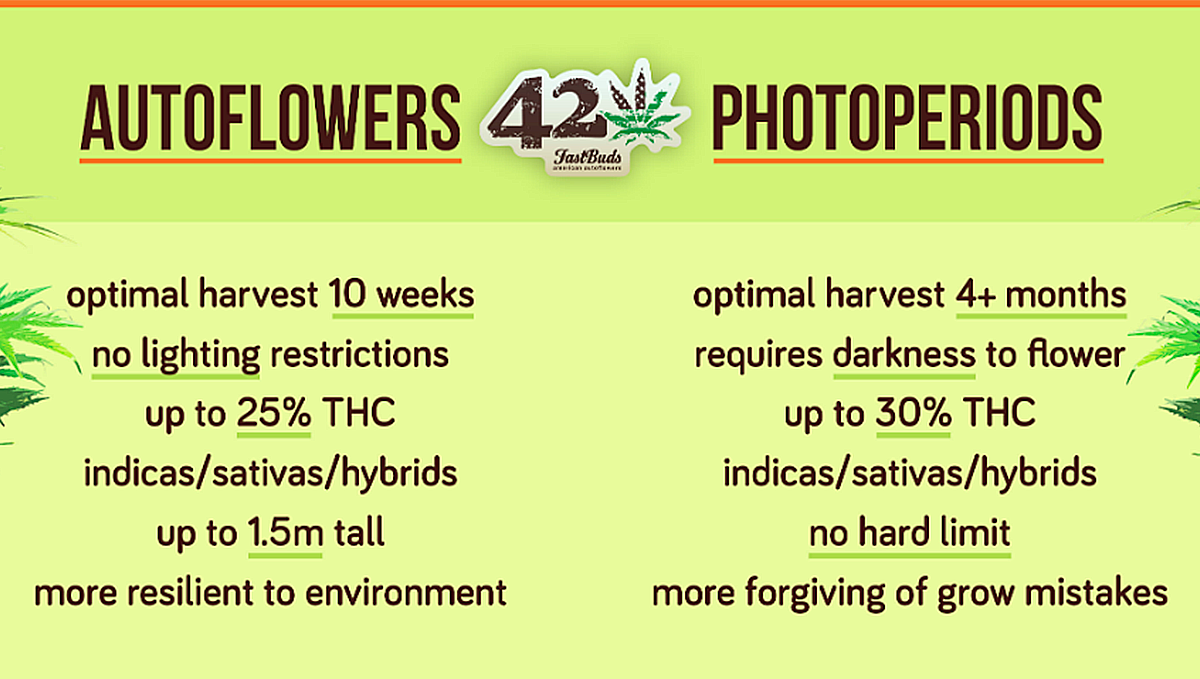
If autoflowering cannabis is the right choice for you, take a look at our catalog of strains and enjoy growing faster!







Comments